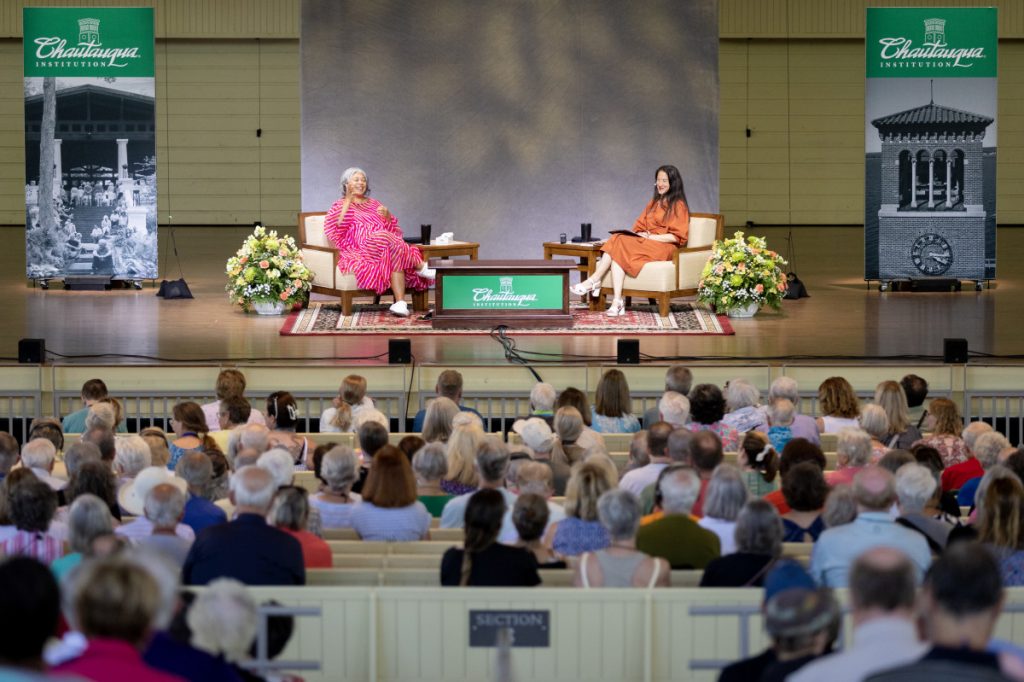
Alton Northup
Staff writer
Angela Garbes is on a mission to redefine motherhood and domestic work.
“I believe that raising children, caring for the elderly, caring for the disabled – I don’t see those things as individual responsibilities,” she said. “I see them as social responsibilities that we all have a stake in.”
Garbes, author of Essential Labor: Mothering as Social Change, discussed her views on motherhood and caregiving, and how they are central to society, at 10:45 a.m. Tuesday in the Amphitheater for the second day of the Chautauqua Lecture Series Week Three theme, “Can the Center Hold? – A Question for Our Moment.”
Garbes, the child of Filipino immigrants, grew up with an up-close perspective of care; her mother was a hospice nurse and her father was a pathologist.
She remembered the late nights her mother worked, sometimes taking shifts as long as 14 hours, and the people her mother helped. Her mother still receives cards from her patients’ family members; some have credited her with helping them overcome their fear of death.
“I think it is just holy work, to take care of people in their most vulnerable times, to give dignity and choice to what they’re doing,” she said.
With two parents in healthcare, their home centered around care. When Garbes had a sore throat, her father would spring to get tests done at his work, and both of her parents discussed death regularly at home.
“Their work democratized human bodies,” she said. “I saw that no matter how much money you have, … no one escapes illness; no one escapes death.”
When Garbes became a parent herself, she said she finally understood the sacrifices her parents made to raise her. After she started writing her book, which tells the history of caregiving in the United States, she learned how her family contributed to it.
In 2020, Garbes joined more than 1 million women who left the workforce, according to Fortune, deciding to care for her children as preschools and daycare centers closed across the nation.
“While I believe that was the most important thing I could be doing, keeping them safe and keeping our community safe, I felt this tension,” she said. “It wasn’t enough for me.”
At a time where they were needed the most, it seemed caregivers had become invisible. With her book, Garbes said she wanted to understand the reasons behind this feeling.
While researching, she found that Filipino nurses accounted for more than 25% of COVID-related nursing deaths, despite making up just 4% of the U.S. nursing population. After digging further, she discovered minorities and immigrants often took healthcare positions that white nurses did not want, such as those in critical care units. Each statistic reminded Garbes of the sacrifices her mother made for her family and her career.
But the issues for care workers, a profession largely made up of minorities, did not start with the pandemic; child care and domestic workers in the United States are three times more likely to live in poverty than the rest of the population, Garbes said.
“We devalue care and domestic labor and the women who do that work,” she said. “It’s a direct result of American slavery.”
Domestic care, Garbes argued, is central to a functioning society. But the ending of slavery, and the later rise of feminism, never solved the issue of domestic labor. Instead, she said, it just outsourced the work to people of color for low wages.
With little systemic support or economic initiative, these caregivers are quickly leaving their jobs. There are now 400,000 fewer elderly care workers in the country, 100,000 fewer childcare workers and 12,000 fewer childcare centers since the start of the pandemic.
“Our country hasn’t set us up with the structures to value care work,” Garbes said. “But that doesn’t mean that we can’t start working on those things.”
Her solution is to create a culture of care where mothering – a term she uses to incorporate all types of caregivers, including sisters, aunties and friends – is a priority.
“Mothering is the work that makes all other work possible,” she said.
She encouraged people to speak openly about who they are caring for and who is caring for them, especially in the workplace. The United States. is the only developed country that does not mandate paid family leave, despite eight out of 10 voters supporting the issue. The country has a caring majority that needs to act, Garbes said.
“Care feels private and individual; it is deeply unifying,” she said. “It’s one of the most unifying things we have as humans.”
Those who hire domestic workers in their homes can work with organizations, such as Hand and Hand: The Domestic Employers Network, to write contracts that include fair pay and benefits.
People can also show their care within their community, such as babysitting a friend’s baby or being there for advice. Garbes said she loved Chautauqua’s “intentional community” where people slow down, open their porches for conversation and consider ways their actions can improve the community.
“I really think showing up and communicating and having those real connections, that’s it,” she said. “… I have so much more love to give than I thought.”




